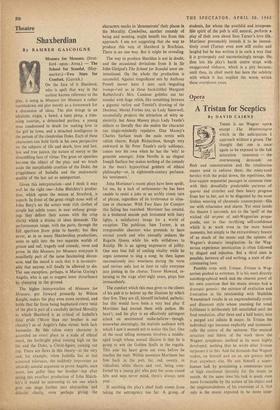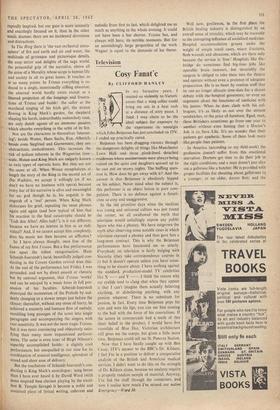Opera
A Tristan for Sceptics
By DAVID CAIRNS
THERE is no Wagner opera except The Mastersingers which in the anticipation I approach without a groan. The thought that one is once again to be exposed to the full saturation treatment — the overweening demands on flesh and concentration and the totalitarian means used to enforce them, the misty-eyed heroics with the pedal down, the repetitions, the four-square sequential passages in common time with their dreadfully predictable •patterns of quaver and crotchet and their heavy progress from bar to bar, not to be disguised by the most tireless weaving of chromatic counterpoint—fills me with reluctance and alarm. Yet once inside the theatre 1 succumb, not to the 'spell' of the wicked old serpent of anti-Wagnerian propa- ganda, nor to that terrifying self-confidence which is at work even in the most banal moments, but simply to the extraordinary beauty of so much of the music and the aptness of Wagner's dramatic imagination. In the Wag- nerian experience intoxication is often followed by disgust and rejection. But a third state is possible, between all and nothing, a state of dis- criminating love.
Possible even with Tristan. Tristan is Wag- nerism pushed to extremes. It is his most directly autobiographical work and the clearest proof of his own assertion that his music always had a dramatic genesis: the mixture of exaltation and frustration in his relationship with Mathilde esendonck results in an unprecedentedly erotic and dissonant style whose yearning for tonal fulfilment is deliberately left unsatisfied until the final resolution, after three and a half hours, into a purged and infinite B major. In Tristan the individual ego becomes explicitly and systemati- cally the centre of the universe. The musical structure and fabric of the work show the Wagner symphonic method at its most highly developed; nothing that he wrote after Tristan surpasses it in this. And the demands that Wagner makes, on himself and on us, are greater here than anywhere else. He sets himself a super- human task by postulating a continuous state of high emotional intensity for the music to match. At the same time his task is made even more formidable by the nature of his object and the singlemindedness of his treatment of it. Not only is the music expected to be more inter- ruptedly inspired, but our gaze is more intensely and exactingly focused on it, than in the other music dramas; there are no incidental diversions and distractions.
In The Ring there is 'the vast orchestral atmo- sphere' of fire and earth and air and water, the multitude of grotesque and picturesque details, the cosy terror and delights of the saga world, the primordial grip of the narrative, above all the sense of a Morality whose scope is human life and society in all its great issues. It touches us at so many points. In Tristan everything is re- duced to a single, intentionally stifling situation; the external world hardly exists except as a blurred projection of the longings and frustra- tions of Tristan and Isolde: the sailor at the masthead singing of his Irish girl, the stream flowing in King Mark's garden, the shepherd shaping his harsh, indescribably melancholy tune, are only dumb agents' of an immense passion. which absorbs everything in the orbit of its fire.
Nor are the characters in themselves 'interest- ing'; beside Wotan, Hans Sachs, Eva, Alberich, beside even Siegfried and Gurnemanz, they are abstractions, embodiments. This increases the risk of tedium inherent in the Wagnerian time- scale. Wotan and King Mark are vulgarly known as twin types of operatic bore. But they are not the same at all. When Wotan recapitulates at length the story of the Ring in the second act• of Die Walkiire, we accept it willingly (or if we don't we have no business with opera), because every bar of his narrative is alive and meaningful for us; god though he is, his anguish is the anguish of a 'real' person. When King Mark elaborates his grief, repeating the same phrases again and again (and how typical of him that his reaction to the final catastrophe should be `Todt den Alles I Alles todt l'), is it not different, because we have no interest in him as an indi- vidual? And, if we cannot accept him completely, does his music not then become an affliction?
So I have always thought, once free of the fumes of my first Tristan. But a fine performance can upset the tidiest categorisation. Hans Schmidt-Isserstedt's lucid, beautifully judged con- ducting in the Covent Garden revival does this. At the end of the performance last Friday I was persuaded, and not by direct assault or rhetoric but by rational argument, that Tristan 'works' and can be enjoyed by a music lover in full pos- session of his faculties. Schmidt-Isserstedt destroyed the momentum of the Prelude by sud- denly changing to a slower tempo just before the climax; thereafter, without any sense of hurry, he achieved a masterly and humane flow of melody, moulding long passages of the score into single paragraphs and accompanying the singers with rare sensitivity. It was not the most tragic Tristan, but it was more convincing and objectively satis- fying than many more impassioned perform- ances. The same is even truer of Birgit Nilsson's superbly accomplished Isolde: a slightly cool performance, but unequalled in our time for its combination of musical intelligence, splendour of sound and sheer ease of delivery.
But the touchstone of Schmidt-Isserstedt's con- ducting is King Mark's monologue: sung better than I have ever heard it by David Ward (with some inspired bass clarinet playing by the excel- lent R. Temple Savage) it became a noble and sustained piece of lyrical writing, coherent and
melodic from first to last, which delighted me as much as anything in the whole evening. It Could not have been a bar shorter. Tristan has, and always will have, its terrible moments. But for an astonishingly large proportion of the work Wagner is equal to the demands of his theme.



































 Previous page
Previous page